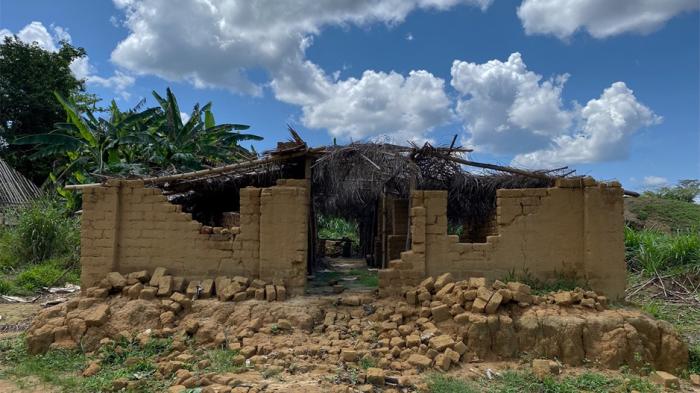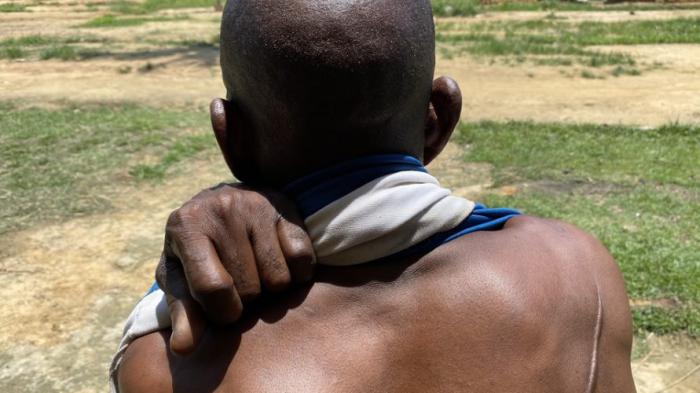DR Congo: Neglected Massacre of Indigenous Group
Read a text description of this video
Text:
Democratic Republic of Congo, Tshuap Province
VO:
Over the first three days of February 2021, violent attacks were carried out in western
Democratic Republic of Congo. At least 66 Indigenous Iyeke people were killed and dozens more wounded by ethnic Nkundo villagers across the district of Bianga.
VO:
At least 40 children were among the dead. The attackers burned more than a thousand houses as well as schools, churches, and health centers in eight villages.
VO:
The silence surrounding these massacres and absence of accountability highlight the longstanding abuse and discrimination suffered by Indigenous people in Congo.
Text:
Congolese lawmakers should pass a bill to protect Indigenous people from violence, discrimination, and treatment as second class citizens.
Text:
All those responsible for these crimes should be fairly prosecuted.
Survivor:
The Nkundo and us would cohabitate, they are our brothers. But they have a tendency to treat us like animals. Here is how they take us for animals: They wouldn’t eat our food; they wouldn’t sleep in our homes or villages.
Survivor:
But we do eat their food, we work for them, we plow their fields, and we build their houses. For them, we are animals… they don’t see us as human beings.
VO:
The lives and culture of Indigenous peoples like the Iyeke are closely linked to the rainforest and its resources, but their customary rights have long been ignored. They have suffered from marginalization, domination and exploitation. I was in the forest with my wife and my mother when we suddenly heard gunshots coming from the village.
Survivor:
I started to run back. I got out of the forest and arrived behind the house… and I saw my child lying on the ground. Plumes of smoke were billowing out of houses… the yard was engulfed in smoke.
Survivor:
Why did this happen? What did we do? I suddenly realized that very few people were
still in the village, everyone had fled.
VO:
One year on, two people were tried and acquitted, no one has been held accountable for these killings and the case is now closed, but there’s been no investigation on the ground. Provincial and local politicians have allegedly interfered with the inquiry, attempting to delay or shut it down.
Survivor:
My child was shot hence why I found him lying on the ground. He had bullets in the back…
I picked him up to bury him. This child died in a meaningless conflict. The authorities must arrest the people who did this and take their weapons for peace to come back. And the government must rebuild our homes so that we can return to living like before.
Text:
Congolese lawmakers should act to address decades of systematic discrimination against Indigenous people.
Text:
Judicial authorities should open a new inquiry and have the means to conduct credible and impartial investigations.
Text:
Congolese authorities should ensure the lyeke are protected and receive adequate redress.
(Kinshasa, February 9, 2022) – Democratic Republic of Congo authorities have failed to fully investigate the killing of at least 66 Indigenous Iyeke people in the Bianga district of Monkoto territory in February 2021, Human Rights Watch said today. Congo’s National Assembly voted during 2021 for a law that would for the first time protect and promote Indigenous peoples’ rights, but the bill remains stalled in the Senate.
From February 1 to 3, 2021, hundreds of ethnic Nkundo assailants killed several dozen Iyeke villagers, including at least 40 children, 22 men, and 4 women, and wounded many more in eight villages. The assailants also burned down more than 1,000 houses as well as schools, churches, and health centers, according to survivors, witnesses, civil society groups, and provincial officials. The authorities initially opened an inquiry but did no field investigation. A year on and no one has been charged for the killings, which have gone largely unreported in the media. Two people were tried and acquitted on lesser charges and the case closed.

